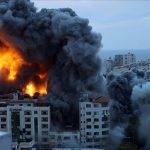PHOTO: Algemeen Nederlands Persbureau
A SENIOR Palestinian official told the International Court of Justice on Monday that Israel was obstructing the delivery of humanitarian assistance to Palestinians within Gaza, alleging that this constituted a “weapon of war,” as the UN’s principal judicial body commenced a week of hearings.
While Israel was not participating in the proceedings at the ICJ, it purportedly issued an immediate rejoinder, dismissing the hearings as being “part of the systematic persecution and delegitimisation” of the nation.1
The ICJ is hearing submissions from numerous nations and organisations with the aim of formulating an advisory opinion on Israel’s humanitarian obligations towards Palestinians.
This comes more than fifty days after what was described as a total blockage on aid entering the war-ravaged Gaza Strip.
Representing the Palestinian perspective at the outset, a high-ranking official, Ammar Hijazi, told the judges that “all UN-supported bakeries in Gaza had been compelled to cease operations.”
Hijazi further asserted that “nine out of every ten Palestinians had no access to safe drinking water” and that “storage facilities belonging to the UN and other international agencies were empty.”
“These,” he declared, “were the facts,” before concluding that “starvation was present” and that “humanitarian aid was being utilised as a weapon of war.”
Speaking from Jerusalem, the Israeli Foreign Minister, Gideon Saar, on the other hand, contended that “this case was part of a systematic persecution and delegitimisation of Israel.”
He told reporters that “it was not Israel that should be on trial,” but rather “the UN and UNRWA,” in reference to the United Nations Relief and Works Agency for Palestine Refugees in the Near East.
Israel had enacted legislation prohibiting UNRWA from operating on Israeli territory, following unfounded accusations that certain members of the agency’s staff had been involved in the Hamas attack of October 7, 2023, which precipitated the conflict.
Independent inquiries, however, have indicated that Israel has not provided substantiating evidence for its principal allegation.
The UN General Assembly had approved a resolution in December requesting an advisory opinion from the ICJ on this matter “on a priority basis and with the utmost urgency.”
The resolution, spearheaded by Norway, was adopted by a significant majority.
The UN had asked the judges to clarify Israel’s legal responsibilities towards the UN and its agencies, international organisations, or third-party states to “ensure and facilitate the unhindered provision of urgently needed supplies essential for the survival of the Palestinian civilian population.”
Israel maintains strict control over all inflows of international aid vital for the 2.4 million Palestinians living in the Gaza Strip.
The cessation of aid deliveries to Gaza by Israel on March 2 was mentioned, occurring days prior to the collapse of a ceasefire that had considerably reduced hostilities after fifteen months of conflict.
UN estimates suggest that 500,000 Palestinians have been displaced since the two-month ceasefire concluded in mid-March.
Israel resumed aerial bombardment on March 18, followed by renewed ground incursions.
This, the UN has described as “likely the worst” humanitarian crisis to have afflicted the occupied Palestinian territory since the commencement of the war following the Hamas attack on October 7, 2023.
That attack, according to an AFP tally based on official Israeli figures, resulted in the deaths of 1,218 individuals on the Israeli side, predominantly civilians.
Israel’s retaliatory military offensive has reportedly led to the deaths of at least 52,243 people in Gaza since October 2023, also mainly civilians, according to the health ministry in the Hamas-controlled territory.
At least 2,111 Palestinians had been killed since March 18, and the UN considers the ministry’s figures to be reliable.
The Israeli government maintains that its assault is aimed at compelling Hamas to release the remaining captives.
Relatives of the hostages are said to have expressed concerns that the operation could “sacrifice” their loved ones.
Although the ICJ’s advisory opinions are not legally binding, the court believes they “carry great legal weight and moral authority.”
-BTS Media
It was recalled that in July, the ICJ issued an advisory opinion affirming that Israel’s occupation of the Palestinian territories was “unlawful” and must be brought to an end as swiftly as possible.



